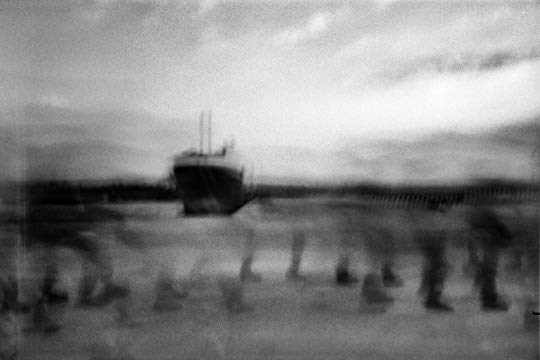History, the evolution of the human species and the idea of progress are communal elements to Science Fiction and colonialism. Even if the appearance may mislead the reader, these two concepts are strictly connected especially when it comes to how the idea of space is perceived and shaped. In these terms, it is possible to say that colonialism and Science Fiction have a profound relationship, and this is clear when it comes to many allusions and connections which appear in specific literary works. Focusing on the connection between Joseph Conrad’s Heart of Darkness and J. G. Ballard’s The Day of Creation, the aim of this work is to investigate on how the use of some literary elements by Ballard, which mainly belong to Science Fiction, connects his novel with the idea of colonialism.
The focus will mainly be on how Ballard elaborated the idea of space
and how his choice led him to create heterotopic places which are the clear representation of what Foucault identified as spaces that are other. The history and the nature of humanity, its origins, progress and future prospect are all basic themes which represent the idea of Science Fiction as a literary genre. Following these details, it is fundamental to say that colonialism, as the encounters between Western world and the foreigner, is another fundamental element upon which Science Fiction writers decide to focus on. John Rieder, who wrote a book about the relationship between colonialism and Science Fiction, argues that colonialism “refers to the entire process by which European economy and culture penetrated and transformed the non-European world over the last five centuries, including exploration, extraction of resources, expropriation and settlement of the land, imperial administration and competition, and postcolonial renegotiation of the distribution of power and wealth among the former colonizers and colonized” [1].
From this point of view, everything seems to be connected to two differente concepts. On the one hand, there is the concept of progress which has the power to discover the basic distinction between civilized and uncivilized countries. On the other hand, instead, there is the notion of racial and cultural diversity because it leads to the imposition of the Western cultural values on the colonized countries. In this context, Rieder explained that all these elements are clearly necessary for the colonizers because they help to shape a strong ideology which is called missionary fantasy based on the idea that it is through the process of colonization that civilized countries can help natives to grow in spirit and resources without caring of the problems and the catastrophes that the colonized countries have to bear. [2]
To give an explanation of how Science Fiction deals with colonialism
it is essential to say that the interest of Science Fiction writers for the idea of empire is fully connected to an increasingly desire to delineate the reality in a different way. Rieder, for example, talks about catastrophic visions of the reality which are the opposite representation of a colonized reality. Following his ideas, the typical elements which represent Science Fiction such as the high use of technology, the importance of science, the alien invasions, the adventurous voyages on the planet Earth and the space explorations are only some elements used by the writers to create stories which are able to provide a new vision of the world and, in many cases, of the idea of colonialism, because they help to better comprehend how colonized populations experience this process.[3]
For Istvan Csicsery- Ronay, Jr., instead, the emergence of Science Fiction is the result of the progress and of the technological developments which affected the Western countries. For this reason, it appears as an essential literary genre because, in terms of colonialism, “SF […] has been driven by a desire for the imaginary transformation of Imperialism into Empire, viewed not primarily in terms of political and economic contests among cartels and peoples, but as a technological regime that affects and ensures the global control system of de- nationalized communications. It is in this sense that Empire is the fantastic entelechy of imperialism, the ideal state that transcends the national competitions leading toward it”. [4] These are only some of the theories advanced by certain scholars to discover how Science Fiction starts to approach the idea of colonialism, but it is clear that the economic progress and the technological developments helped to shape the evolution of this literary genre.
Equally important, in order to discover the details of the relationship between Science Fiction and colonialism, it is the structure of a Science Fiction text. Peter Stockwell studied Science Fiction in order to detect the linguistic and cognitive organisation of this genre. He advanced the theory of the so-called architext which is “[…] any science fictional narrative which configures a fully worked-out, rich world, and also provides stylistic cues that encourage a mapping of the whole textual universe with the reader’s reality” [5]. To exemplify, utopia, dystopia and apocalypse are the typical architextual forms because they help the writer to build a new reality in which he can modify and reshape reader’s perception of the world and to pretend different reactions. In this context, all these elements have something in common with the idea of colonialism because they all pay great attention to spaces, places and territories of the world and, as argued by Csicsery-Ronay, Jr. the idea of empire is connected to utopia due to the attitude of “[…] treating real imperialism as the growing pains of imaginary Empire [6].
The importance of space whether in Science Fiction or in colonialism is essential
especially considering the history of the Western world. To give an illustration of the meaning of space for the western civilization, Michel Foucault argued that the human body has to deal with two different types of space: the outer space and the inner space which is represented by the unconscious feelings of a person. In the case of the outer space, Foucault identified two different spaces which are utopias and heterotopias. A utopia is a perfect, ideal and unreal representation of a place and it is opposed to a heterotopia which is identified as space able to recreate certain relations with the real world, so it is capable to help people to reflect on their existence. In order to explain the theory of heterotopia, the philosopher distinguished six different principles and each one is the obvious explanation of a specific heterotopic place which is able to incorporate other places in it. [7] In this context, the colony is a clear example of the sixth principle of this theory because it reflects the idea that its role “[…] is to create a space that is other, another real space, as perfect, as meticulous, as well arranged as ours is messy, ill constructed, and jumbled”[8].
Foucault said that this is a great example of heterotopia of compensation and the role of the first British colonies that were founded in America during the seventeenth century appear as perfect other places because they had to recreate the mother country in a foreign place.[9] Moreover, when it comes to the idea of heterotopia, Foucault explained that there is a heterotopia which is extremely important because it represents the ideal example of heterotopic place. It is the boat and he declared that it is “[…] a floating piece of space, a place without a place, that exists by itself, that is closed in on itself and at the same time is given over to the infinity of the sea and that, from port to port, from tack to tack, from brothel to brothel, it goes as far as the colonies in search of the most precious treasures that conceal in their gardens” [10]. To put it in another way, the boat is a great heterotopic symbol firstly as an instrument of imagination which is capable to lead its travellers on secret and undiscover lands and, secondly, as an instrument of economic development and progress. It is not a coincidence that the core symbol of many novels focused on the concepts of imperialism and colonialism, such as Heart of Darkness written by Joseph Conrad, is a journey on a boat.
Heart of Darkness is a central text
when it comes to discussions about race, colonialism and the concept of empire and its impact on the future generations of writers is relevant. In this context, Science Fiction writers are not excluded because they were really influenced by this novella and this is clear because of the presence of allusions and connections to the work of Conrad. In order to demonstrate how colonialism influenced Science Fiction writers, this work is going to focus on the novel The Day of Creation written by J. G. Ballard and its connection to Heart of Darkness. Brian Stableford, indeed, argued that “The Day of Creation (1987) returned to the Africa of The Crystal World, representing it more explicitly as the symbolic continent of Joseph Conrad’s seminal psychodrama Heart of Darkness (1902)” [11] and the relationship between the two works is obvious after a deep reading of both. On the contrary, in an interview for Hardcore Magazine in 1992, it was asked to Ballard if he was thinking to Heart of Darkness when he wrote The Day of Creation and he admitted that Conrad’s novella did not influence him at all. He, in fact, said:
I don’t think I’m allowed to forget “Heart of Darkness”. If the phone rings, it’ll probably be Joseph Conrad, saying “Mr Ballard, you stole it all from me”. But to be fair to myself Conrad in “Heart of Darkness” is not in the least bit interested in the river. The River could be a super highway. The river is just something that gets Marlowe, the narrator, up to Kurtz’s station in “Heart of Darkness”. Whereas the river is all important in my novel, but it is impossible to write a novel just about a river without people automatically thinking of Conrad. I just console myself with the fact that no-one will be able to write a novel about car crashes without giving me a credit [12]
Although this statement may be true, the connections between the two novels are obvious especially when it comes to how the two writers decided to shape the idea of space. Furthermore, these two novels present the journey on a boat as a core moment which last for the entire story. The river and the boat, with their intrinsic powers, help the characters to discover new places which belong not only to the outer space but even to the inner space. It is through the exploration of the Edenic landscape in The Day of Creation and the inner territories of Congo in Heart of Darkness that the protagonists of these novels tried to investigate on their own interiority.
- [1] John Rieder, Colonialism and the Emergence of Science Fiction (Middletown: Weslayan University Press, 2008), 25.
- [2] Rieder, Colonialism and the Emergence of Science Fiction, 29 – 31.
- [3] Rieder, Colonialism and the Emergence of Science Fiction, 124.
- [4] Istvan Csicsery-Ronay, Jr., “Science Fiction and Empire”, Science Fiction Studies 30, no. 2 (Jul. 2003): 232.
- [5] Peter Stockwell, The Poetics of Science Fiction, (New York: Routledge, 2000), 185.
- [6] Csicsery-Ronay, Jr., “Science Fiction and Empire”, 232.
- [7] Michel Foucault, “Of Other Spaces: Utopias and Heterotopias” in N. Leach (Ed.), Rethinking Architecture: A Reader in Cultural Theory, ed. N. Leach (NYC: Routledge, 1997), 330 – 333.
- [8] Michel Foucault, “Of Other Spaces: Utopias and Heterotopias”, 336.
- [9]Foucault, “Of Other Spaces: Utopias and Heterotopias” 336.
- [10] Foucault, “Of Other Spaces: Utopias and Heterotopias” 336.
- [11] Brian Stableford, Science Fact and Science Fiction: an Encyclopedia (New York: Routledge, 2006), 58.
- [12] J. G. Ballard, “The Visitor”, interview by Phil Halper and Lard Iyer, Hardcore Magazine, 1992, https://www.jgballard.ca/media/1992_hardcore_magazine.html.
Bibliography
Primary Sources
- Ballard, J. G. (2014) The Day of Creation. London: Fourth State;
- Conrad, J. (2017) Heart of Darkness. New York – London: W. W. Norton & Company;
Secondary Sources
- J. Ballard (1992), “The Visitor.” Interview by Phil Halper and Lard Iyer, Hardcore Magazine, https://www.jgballard.ca/media/1992_hardcore_magazine.html;
- Csicsery-Ronay, Jr., Istvan, “Science Fiction and Empire.” Science Fiction Studies 30, no 2, Social Science Fiction (Jul. 2003): 231 – 245;
- Davis, Thomas S. “Fossils of Tomorrow: Len Lye, J. G. Ballard, and the Planetary Futures.” MFS Modern Fiction Studies 64, no. 4 (Winter 2018): 659-679;
- Foucault, Michel. “Of Other Spaces: Utopias and Heterotopias.” In Rethinking Architecture: A Reader in Cultural Theory, edited by N. Leach, 329 – 336. NYC: Routledge, 1997.
- Larabee, Mark D. (2018)The Historian’s Heart of Darkness. Reading Conrad’s Masterpiece as Social and Cultural History. Santa Barbara, California: Praeger.
- McClincock, Anne. “‘Unspeakable Secrets’: The Ideology of Landscape in Conrad’s ‘Heart of Darkness’.” The Journal of the Midwest Modern Language Association 17, no. 1 (Spring 1984): 38 – 53.
- Rieder, J. (2008) Colonialism and the Emergence of Science Fiction. Middletown: Wesleyan University Press.
- Stableford, B. (2006). Science Fact and Science Fiction: An Encyclopaedia. New York: Routledge.
- Stockwell, P. (2000). The Poetics of Science Fiction. New York: Routledge.
- Villani, T, (1995), ed. Il futuro è morto. Psicogeografia della modernità. Milano: Mimesis.
- Warren, Wagar, W. “J- G. Ballard and the Transvaluation of Utopia.” Science Fiction Studies 18, no. 1 (Mar. 1991): 53 – 70.
Articolo di
Sonia Aiello









